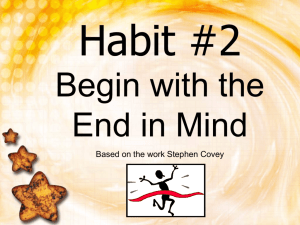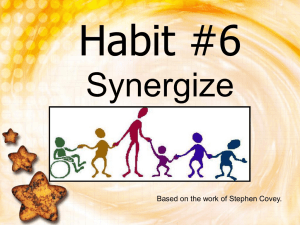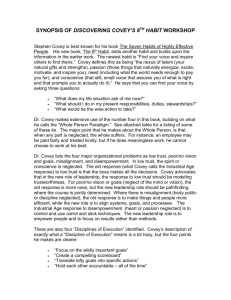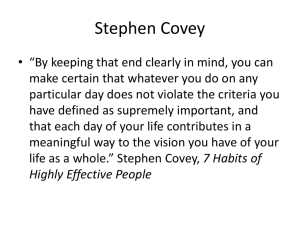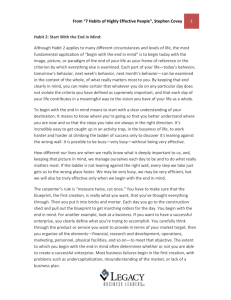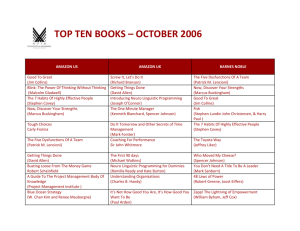Case Study on Stephen R. Covey
advertisement
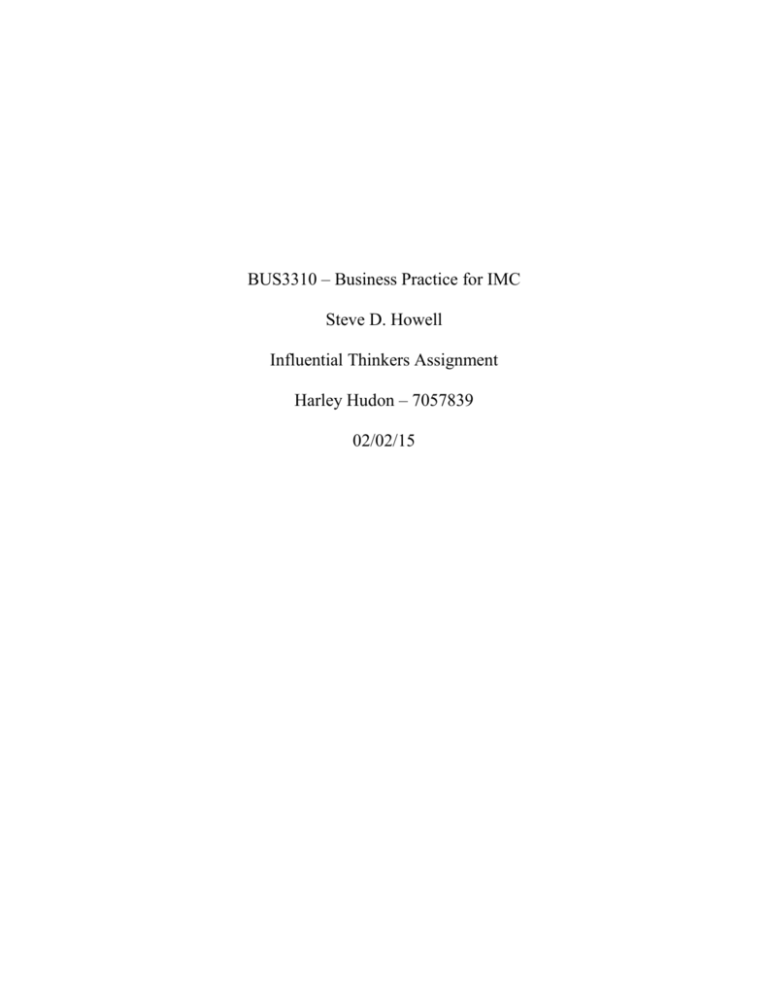
BUS3310 – Business Practice for IMC Steve D. Howell Influential Thinkers Assignment Harley Hudon – 7057839 02/02/15 1 Case Study Report Stephen Richards Covey Biography Stephen Richards Covey (1932-2012) was an American author, businessman, theorist, keynote speaker, professor and father. Covey’s most acknowledged accomplishment was through his book “The 7 Habits of Highly Effective People” (1989). Covey was recognized for his highly positive contributions to society. Stephen R. Covey was born on Oct.24, 1932 in Salt Lake City, Utah. Covey remained in Salt Lake City upon graduating high school to pursue a post-secondary education from the University of Utah. Covey completed a Bachelor of Science degree in business administration while studying at the University of Utah, which lead to many more scholarly accomplishments in his life. Education: 1 University of Utah (Bachelor of Science degree – business administration) Master of Business Administration (MBA) – Harvard University Doctorate of Religious Education (DRE) – Brigham Young University Family was very important to Stephen R. Covey. As his career developed so did his relationship his family members. The Covey’s home is in Provo, Utah where all of his children were born and raised. Family: Stephen R. Covey was happily married to his wife Sandra Merrill. Covey is a father of 9 children Covey has a total of 52 grandchildren Religion: Stephen R. Covey was a Mormon. Many argue that his philosophies are strictly driven through religious insights. However Covey always denied those allegations, claiming that he derived his philosophies based on history’s greatest thinkers as well as Scriptures (theoretical passages)2 1 Education: https://www.stephencovey.com/about/about.php Religion: http://www.nytimes.com/2012/07/17/business/stephen-r-covey-herald-of-good-habits-dies-at79.html?_r=0 2 2 Stephen Richards Covey passed away in the hospital on July 16, 2012 due to complications from a cycling accident that occurred in his hometown Provo, Utah. Covey was 80 years old.3 Major Publications & Achievements Stephen R. Covey`s most acknowledged work was through his book ‘The 7 Habits of Highly Effective People` (1989). This was also Covey`s first major publication. Covey continued to write books (3) while establishing himself on a national scale as an influential thinker and positive contributor to society. Books: The 7 Habits of Highly Effective People (1989) The 8th Habit (2004) The Leader In Me (2008) List of Milestones: 4 Forbes titled ‘7 Habits` as one of the most influential books of the 20th century ‘7 Habits` sold more than 1.5 million audiobooks ‘7 Habits` voted number 1 best-selling hardcover on family Second book ‘The 8th Habit` sells over 1 million copies Covey was awarded The National Fatherhood Award due to his works Named speaker of the year (1999) International Man of Peace Award Co- Founder & Vice chairman of Franklin Covey Awarded 12 honorary doctorates (entrepreneurial, national, theoretical, management, family) Philosophical Insights Stephen R. Covey establishes his theories/ philosophies clearly in his book ‘The 7 Habits of Highly Effective People’ (1989). Covey explores 7 different philosophies that make for a highly effective individual if practiced. The 7 Habits: 5 1. Be Proactive: Your life is carefully designed by you, take responsibility for your actions and the way that you choose to live your life. Focus on ‘I can’ and take matters into your own hands. Fulfill your objectives, and take life by the horns. 2. Begin with the End in Mind: Mental creation can lead to physical objectives. Just as a building requires a carefully designed blue chart before it is built, so does 3 Cycling Accident: http://www.nytimes.com/2012/07/17/business/stephen-r-covey-herald-of-good-habitsdies-at-79.html?_r=0 4 Milestones: https://www.stephencovey.com/about/about.php 5 7 Habits: https://www.stephencovey.com/7habits/7habits.php 3 3. 4. 5. 6. 7. life. Once you have drafted a plan, you can then commence the steps required to be successful. Similar to a personal mission statement, you must believe it yourself. Put First Things First: Life management focused on your personal values, roles, purposes and priorities. Organize your life in a way that will push you forward instead of backward. Think Win-Win: Life is a cooperative arena, meaning that we need to work together in order to fulfill our own objectives, and those of others. Society has largely been moulded around a competitive attitude, this is not healthy. We must seek mutual benefits through integrity, maturity and accumulation. Seek First to Understand- Then be Understood: Most people converse while listening in their own minds. When this happens we are not fully comprehending or listening. When we converse while thinking we listen selectively, prepare our rebuttal, and enter a comparative analysis through a competitive iteration. We must listen, understand and relate. Synergize: Two heads are better than one. This entails creative cooperation, teamwork and open-mindedness. Accept the fact that everyone is different, then constructively develop ways to work effectively together. Sharpen the Saw: Preserve and enhance your mind, body and soul. Physically – Eating healthy, exercising, sleeping schedule etc. Socially/Emotionally – Making social and meaningful connections with others. Mental – Learning, reading, writing, teaching Spiritual – Spending time in nature, expanding our spiritual self through meditation, music, arts, religion and culture. The 8th Habit The 8th Habit is Covey’s second book that focuses on finding your own voice in order to inspire others to find their own. The book focuses primarily on the spirit, mind, body and soul. Covey examines each category and applies his own philosophies behind each element. The Leader in Me The Leader in me was Covey’s third book. The book examined specific case studies in which his 7 habits of highly effective people were applied to students, teachers, professionals, business leaders and everyday citizens. The book provides real case studies that have been built through his philosophies and proven to be highly effective. Personal Opinion on Covey’s Philosophies I think that Covey’s 7 Habits of Highly Effective People are all individually practical. Each habit identifies mannerisms that are too often overlooked. However in order to practice each of the habits in unison would require time, patience and motivation. As 4 Covey believes, each habit must be practiced in order to have a highly effective individual. In essence what Covey is creating is his idea of a perfect person. Once all of the habits are moulded into daily life you are invincible, nothing can touch you because you know how to effectively manage your life. However Covey mainly iterates on the positive aspects of his habits. This is concerning for me as we are only human beings, we will slip and fall. I’m not sold on the fact that 7 habits are going to prevent me from crashing and burning. Influence on My Life Personal: Covey’s 7 habits to become a highly effective person will affect some aspects of my personal life. The habit that related to me the most was the 5th, Seek First to Understand – Then be Understood. I am aware that I have a defensive personality, and that I always have a ‘better’ story to tell after barley listening to the one that was just told to me. I acknowledge that I have to relax, listen and try my best to relate. Professionally: All 7 habits should affect me on a professional standard. Although I’m skeptical about being able to apply each habit to my everyday life, each area bears high value to me as a professional. Not only would it affect me, but the publics that I work with as well. In order to apply the 7 habits to my life it will require a level head, perseverance and most importantly patience. References 5 Douglas Martin, “Stephen R. Covey, Herald of Good Habits, Dies at 79”. The New York Times, published July 16, 2012. Franklin Covey “About Stephen R. Covey” – Personal Bio. Accessed online from: https://www.stephencovey.com/about/about.php Franklin Covey “The 7 Habits of Highly Effective People” – Process. Accessed online from: https://www.stephencovey.com/about/about.php
